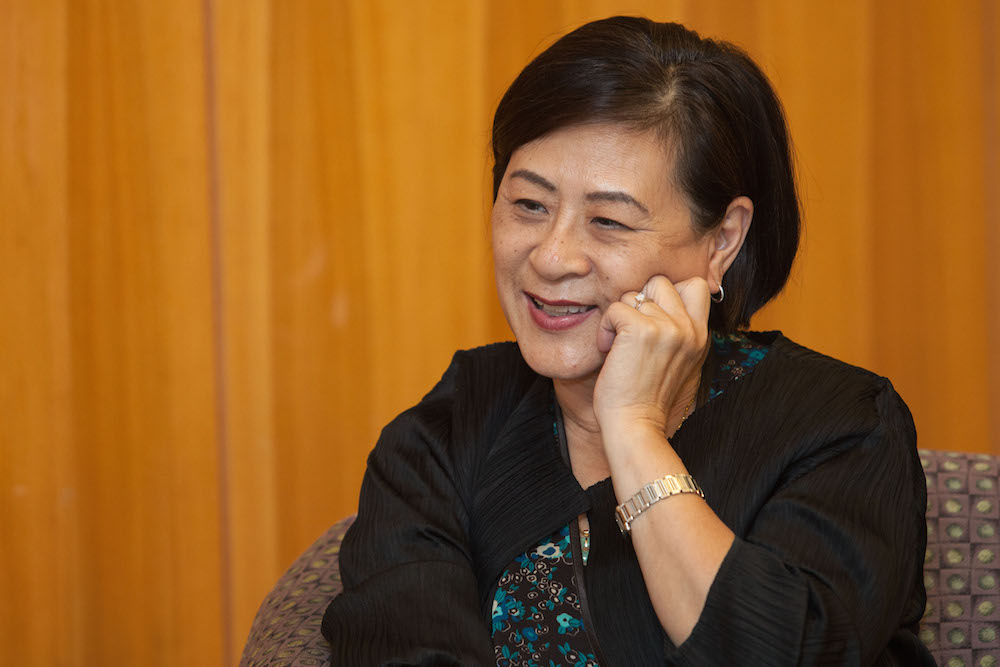
Mae M. Ngai is professor of history and Lung Family professor of Asian-American Studies at Columbia University. Her work centers on questions of immigration, citizenship, and nationalism. She is author of the books Impossible Subjects: Illegal Aliens and the Making of Modern America and The Lucky Ones: One Family and the Extraordinary Invention of Chinese America. Before she participated in a panel on the legacy of the 1965 Immigration Act, Ngai talked about Chinese miners in unlikely places around the world, returning to college late, and how much Americans really understand the Constitution.
What’s your happiest childhood memory?
That’s really hard. I don’t know. When I was a kid I wanted to be an architect so I loved to make drawings of houses I wanted to build in future. I spent hours doing that.
You’re working on a book called Yellow and Gold: The Chinese Mining Diaspora, 1848-1908. What is the unlikeliest place where these Chinese miners ended up?
South Africa—the Transvaal colony and the Witwatersrand. The Chinese miners who went to the gold rushes in California or Canada or Australia or New Zealand were like gold rushers all over world. They would show up and see if they could make their fortune. There’s a lot of misunderstanding about them—there’s the assumption they were indentured or coolies. They weren’t.
But miners who went to South Africa, they were indentured. They went a little later—1904. They worked in deep gold mines—there were about 60,000 Chinese who went. There are a lot of interesting things about that program because those workers came from northern China. The Randlords—mining magnates—had tried to recruit from traditional areas like Guangzhou and Fujian, but people wouldn’t go. News had traveled back from Johannesburg’s resident Chinese population, “Don’t come here. It’s a hell.” And by that time in southern China, the long distance coolie trade was winding down. If they went abroad to work, they would go to Malaysia or Singapore, not to Africa. The South Africans couldn’t recruit in southern China, so they recruited in northern China. It helped that Herbert Hoover was working for mining companies in northern China [and he became a supplier of labor to South African mines]. Then there was the Russo-Japanese War. There was an interesting confluence of factors that led these people to go. And once they got there, they didn’t act like coolies. They went on strike, rioted, deserted, and refused to work. They all got sent back as part of the program. The South Africans didn’t want the Chinese to stay.
What teacher or professor changed your life, if any?
I would have to say Robert Carey. When I went to college a long time ago, I dropped out. I wanted to work in the community. I was an activist. I started a family. When I went back, I was in my late 30s. I went to this program for returning students that was part of the State University of New York, Empire State College. Bob Carey was my mentor there. He’s a historian and I read labor history with him because I was a labor activist. And he said, “Well, maybe you want to think about grad school or law school.” I nearly fell out of chair—why would I want to do that? So he put the seed in the back of mind. I started thinking, How would I go about doing it?
What year, past or future, would you time travel to if you could?
I don’t think I want to go to the future because if it’s bad I don’t want to know. I hope it’s better, but it could be bad. I would like to travel to an age that’s not modern to see how people managed when they didn’t have running water or medicine or cars. I wouldn’t want to stay too long.
What’s your guilty TV-watching pleasure?
I don’t feel guilty watching TV. I like HGTV. I like Love It or List It, Fixer Upper, and House Hunters.
What music do you like to dance to?
(Laughs.) I like the old Motown stuff.
What does it mean to be American?
A lot of people say they don’t really know what it means to be American till they go abroad. There’s a whole culture of being American, which I think is fairly common across ages and ethnic groups and class. There’s a certain confidence Americans have. It’s not necessarily arrogance, but a certain sense of the privilege that we have, although we may not understand it as privilege so much as an entitlement. There’s a certain confidence that comes from being from a wealthy country even if you’re not a rich person. We used to say that being an American had to do with upholding the Constitution regardless of your origin or your race. I don’t know if many Americans could tell you what’s in the Constitution today. Or they’re very selective about what’s in the Constitution.



